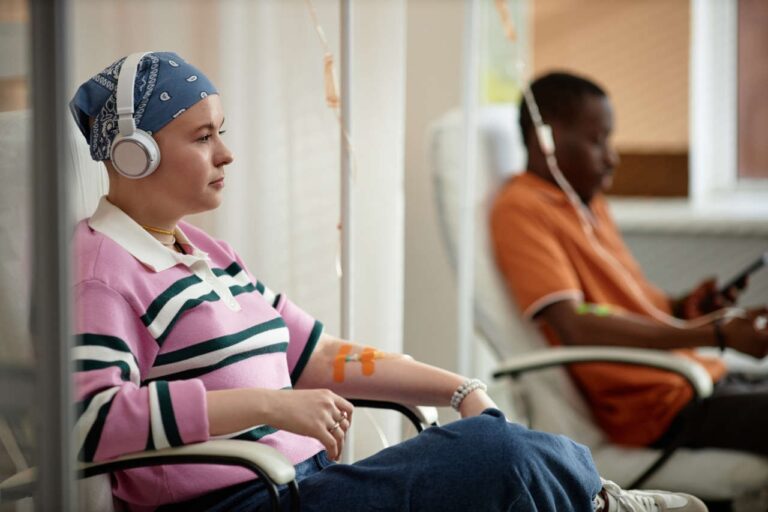
¿Qué es Opdivo?
Opdivo es un nombre comercial para el medicamento nivolumab, que es un tipo de fármaco de inmunoterapia que se usa para tratar ciertos tipos de cáncer. Opdivo fue aprobado por primera vez por el FDA En 2014, se utilizó para tratar el melanoma avanzado que no responde a otros tratamientos. Desde entonces, el Opdivo ha sido aprobado para varios otros tipos de cáncer gracias a los resultados positivos de sus ensayos clínicos, que respaldan su seguridad y eficacia en el tratamiento de diversos tipos de cáncer.
Habla con un especialista
Acerca de la asistencia para copagosEste medicamento de inmunoterapia pertenece a la clase de fármacos anti-muerte celular programada-1 (PD-1), que ataca y bloquea principalmente la actividad de proteínas específicas que suprimen el sistema inmunológico.
Opdivo solo está disponible con receta médica y viene en una solución inyectable en vial de dosis única.
¿Para qué se utiliza Opdivo?
Desde la primera aprobación de Opdivo hasta ahora, la FDA ha aprobado el uso de Opdivo en el tratamiento de varios tipos de cáncer, que incluyen:
- Melanoma (cáncer de piel avanzado)
- Cáncer de pulmón de células no pequeñas metastásico
- Carcinoma de células escamosas de cabeza y cuello
- Linfoma de Hodgkin clásico (cáncer de linfocitos)
- carcinoma hepatocelular (cáncer de hígado)
- Carcinoma urotelial (cáncer de vejiga y vías urinarias)
- Carcinoma de células renales avanzado (cáncer de riñón)
- Cáncer colorrectal (cáncer de intestino)
- Cáncer de esófago (cáncer que se desarrolla en el esófago)
- Mesotelioma pleural maligno (cáncer del revestimiento del pulmón)
- Cáncer gástrico (cáncer de estómago)
- Cáncer de la unión gastroesofágica (cáncer que se produce donde el esófago se une al estómago)
- Adenocarcinoma esofágico (cáncer que comienza en las células glandulares del esófago)
El Opdivo se utiliza comúnmente para tratar el cáncer avanzado o metastásico que ha invadido otras partes del cuerpo y es resistente al tratamiento con terapias convencionales. A menudo se utiliza solo o combinado con otros tratamientos oncológicos, como inmunoterapia, quimioterapia y radioterapia.
¿Cómo funciona Opdivo?
Opdivo contiene un fármaco activo llamado nivolumab, un anticuerpo monoclonal Que funciona ayudando al sistema inmunitario a combatir las células cancerosas. Normalmente, nuestro sistema inmunitario cuenta con células especializadas, específicamente linfocitos T, que pueden detectar y destruir las células cancerosas. Sin embargo, algunas células cancerosas producen proteínas llamadas PD-L1 y PD-L2 para evitar la detección de los linfocitos T. Estas proteínas (PD-L1 y PD-L2) se unen a un receptor en los linfocitos T llamado PD-1 e inhiben su actividad, impidiendo así que los linfocitos T ataquen a las células cancerosas y permitiéndoles crecer y propagarse.
El Opdivo está diseñado para unirse al receptor PD-1 de los linfocitos T. Al unirse al receptor PD-1, impide que las proteínas de las células cancerosas (PD-L1 y PD-L2) se unan a los linfocitos T y los desactiven. Esto permite que los linfocitos T permanezcan activos y reconozcan y destruyan las células cancerosas.
Al bloquear la unión de las proteínas PD-L1 y PD-L2, Opdivo aumenta la capacidad del sistema inmunológico para identificar y destruir las células cancerosas, ralentizando o deteniendo el crecimiento del tumor.
Forma farmacéutica y concentraciones
Opdivo está disponible en un vial de dosis única que contiene una solución incolora a amarillo pálido con las siguientes concentraciones:
- 40 mg/4 ml
- 100 mg/10 ml
- 120 mg/12 ml
- 240 mg/24 ml
Dosificación
Información de dosificación
La dosificación de Opdivo depende del tipo de cáncer a tratar y de otros factores individuales, como el peso y el estado general de salud del paciente. Las dosis recomendadas de Opdivo como agente único (monoterapia) en pacientes con diferentes tipos de cáncer son las siguientes:
Como agente único (monoterapia)
La dosis intravenosa de Opdivo es de 240 mg una vez cada 2 semanas o 480 mg una vez cada 4 semanas, que se infunde durante 30 minutos en pacientes adultos con melanoma, cáncer de pulmón de células no pequeñas metastásico, carcinoma de células renales avanzado, linfoma de Hodgkin clásico, carcinoma de células escamosas de cabeza y cuello, localmente avanzado o metastásico. carcinoma urotelial, carcinoma de células escamosas de esófago y cáncer colorrectal.
- Para pacientes pediátricos con cáncer colorrectal (que pesan 40 kg o más), Opdivo se administra por vía intravenosa cada 4 semanas a una dosis recomendada de 240 mg durante 30 minutos.
- Para pacientes pediátricos (12 años o más) con cáncer colorrectal y que pesan menos de 40 kg, la dosis de Opdivo como agente único es de 3 mg/kg una vez cada 2 semanas, durante 30 minutos.
Obtenga asistencia financiera para Opdivo
Combinado con otras terapias
Las dosis intravenosas (IV) recomendadas de Opdivo en combinación con otros tratamientos contra el cáncer, como quimioterapia, inmunoterapia o radioterapia, son las siguientes:
Para el melanoma metastásico
Combinado con ipilimumab
Cuando se utiliza con ipilimumab, Opdivo se administra por vía intravenosa durante 30 minutos, una vez cada 3 semanas, a una dosis de 1 mg/kg. Ipilimumab se administra el mismo día por vía intravenosa durante 90 minutos a una dosis de 3 mg/kg. El número máximo de dosis de la terapia combinada no debe exceder cuatro. Tras completar cuatro dosis de la terapia combinada, se administra Opdivo solo.
Para el cáncer de pulmón de células no pequeñas metastásico
Combinado con ipilimumab
El paciente recibe 3 mg/kg de Opdivo por vía intravenosa durante 30 minutos cada 2 semanas, junto con ipilimumab, que se administra en una dosis de 1 mg/kg por vía intravenosa durante 30 minutos cada 6 semanas. El tratamiento continúa hasta que la enfermedad progrese o hasta que se presenten efectos secundarios inaceptables. Si no hay progresión de la enfermedad, el tratamiento puede continuar hasta 2 años.
Para el cáncer gástrico, el adenocarcinoma esofágico y el cáncer de la unión gastroesofágica
Combinado con quimioterapia que contiene fluoropirimidina y platino
El Opdivo se administra por vía intravenosa cada 2 semanas a una dosis de 240 mg o cada 3 semanas a una dosis de 360 mg, junto con quimioterapia con fluoropirimidina y platino. El tratamiento puede durar hasta 2 años.
Para el carcinoma avanzado de células renales
Combinado con ipilimumab
Cuando se utiliza con ipilimumab, Opdivo se administra por vía intravenosa cada 3 semanas a una dosis de 3 mg/kg, junto con ipilimumab, que se administra por vía intravenosa a una dosis de 1 mg/kg durante 30 minutos el mismo día, hasta un máximo de cuatro dosis. Tras completar las cuatro dosis de la terapia combinada, Opdivo se administra solo durante un máximo de 2 años.
Conjunto con cabozantinib
La dosis intravenosa de Opdivo es de 240 mg IV durante 30 minutos cada 2 semanas en combinación con cabozantinib 40 mg por vía oral una vez al día (sin alimentos).
Para el carcinoma hepatocelular
Combinado con ipilimumab
Opdivo e ipilimumab se administran conjuntamente hasta en cuatro dosis. Opdivo se administra cada tres semanas por vía intravenosa a una dosis de 1 mg/kg, mientras que ipilimumab se administra el mismo día por vía intravenosa a una dosis de 3 mg/kg. Tras completar las cuatro dosis de la terapia combinada, Opdivo se administra solo.
Para adultos y niños con cáncer colorrectal
Combinado con ipilimumab
Opdivo e ipilimumab se administran conjuntamente por vía intravenosa cada 3 semanas. Opdivo se administra en dosis de 3 mg/kg y ipilimumab en dosis de 1 mg/kg durante 30 minutos el mismo día, hasta un máximo de cuatro dosis en adultos con un peso corporal igual o superior a 40 kg. Tras completar las cuatro dosis del tratamiento combinado, Opdivo debe administrarse solo.
Para el mesotelioma pleural maligno
Combinado con ipilimumab
Para pacientes adultos, la cantidad sugerida de Opdivo es de 360 mg/kg por vía intravenosa, administrada cada 3 semanas, junto con ipilimumab, que también se administra por vía intravenosa en una dosis de 1 mg/kg, administrada cada 6 semanas.
¿Cómo se administra Opdivo?
El Opdivo se administra por vía intravenosa. La administración intravenosa suele tardar entre 30 y 90 minutos. Este medicamento se administra lentamente cada 2 a 4 semanas.
La dosis y frecuencia recomendadas de Opdivo pueden variar dependiendo de la condición específica que se esté tratando y si se utiliza como tratamiento independiente o en combinación con otros medicamentos contra el cáncer.
Obtenga asistencia para el copago
Asistencia financieraEfectos secundarios

Los efectos secundarios de Opdivo pueden variar dependiendo de si se administra como monoterapia (solo) o combinado con otros medicamentos de inmunoterapia o quimioterapia. Efectos secundarios del Opdivo como tratamiento independiente (que podrían afectar a más de 1 de cada 10 personas) incluyen:
- Cansancio (fatiga o cansancio extremo)
- Náuseas leves
- Dolores musculares y óseos
- Diarrea
- Tos
- Erupciones y picazón
- disminución del apetito
- Dolor articular (artralgia)
- Aumentar la presión arterial
- Fiebre (pirexia)
- Vómitos
- dolores de cabeza
- Hinchazón
- Constipación
- Dificultad para respirar (disnea)
- Dolor abdominal
- Infecciones de la garganta y la nariz
Pacientes que reciben Opdivo combinado con ipilimumab Puede experimentar los siguientes efectos secundarios comunes:
- niveles bajos de hormonas tiroideas (hipotiroidismo)
- Disminución de peso
- Disminución del apetito
- Constipación
- Mareo
- Fatiga
- Diarrea
- Náuseas
- Picazón (prurito)
- Dolor abdominal
- Tos con vómitos
- Infección del tracto respiratorio superior
Pacientes que reciben Opdivo combinado con quimioterapia Puede experimentar los siguientes efectos secundarios comunes:
- Náuseas
- Disminución del apetito
- Fatiga
- Erupción
- Constipación
Pacientes que reciben Opdivo combinado con ipilimumab y quimioterapia Puede experimentar los siguientes efectos secundarios:
- Náuseas
- Disminución del apetito
- Fatiga
- Erupciones y picazón
- Constipación
- Dolor musculoesquelético
Pacientes que reciben Opdivo combinado con cabozantinib Puede experimentar los siguientes efectos secundarios:
- Problemas de hígado
- Síndrome de eritrodisestesia palmoplantar (síndrome mano-pie)
- llagas en la boca
- Hipertensión
- Cambios en el sentido del gusto
- Dolor abdominal
- Fatiga
- Dolor musculoesquelético
- Sarpullido, enrojecimiento, dolor, hinchazón o ampollas en la palma y la planta del pie.
- Poco apetito
- Estomatitis
Pacientes que reciben Opdivo combinado con fluoropirimidina y quimioterapia que contiene platino pueden experimentar los siguientes efectos secundarios durante su tratamiento:
- Dolor, entumecimiento, ardor u hormigueo en las manos o los pies.
- llagas en la boca
- Dolor musculoesquelético y abdominal
- Constipación
- Sentirse cansado
- Diarrea
- Vómitos
Habla con un especialista
Acerca de la asistencia para copagosPrecauciones al tomar Opdivo
No debe tomar Opdivo si:
- Tiene antecedentes de enfermedades autoinmunes como lupus, enfermedad de Crohn, o colitis ulcerosa.
- Ha recibido un trasplante de órgano.
- Ha recibido quimioterapia o radioterapia en el pasado.
- Tiene trastornos nerviosos como el síndrome de Guillain-Barré o miastenia gravis.
- Tiene enfermedad del hígado.
- Está embarazada o planea quedar embarazada, ya que Opdivo causa toxicidad embriofetal.
- ¿Está amamantando a un niño o planea amamantarlo?
Costo
La solución intravenosa Opdivo (10 mg/ml) cuesta aproximadamente $1272. Sin embargo, el costo puede variar según la farmacia que visite y su seguro médico actual. Podría haber asistencia para el copago. Contáctanos Si está interesado en asistencia financiera para Opdivo.












